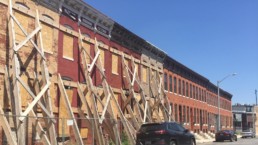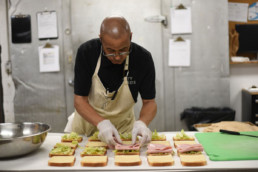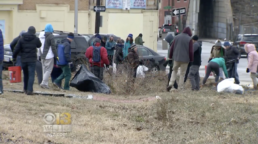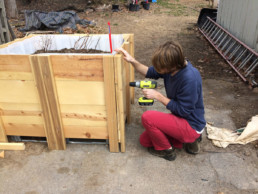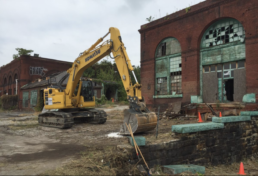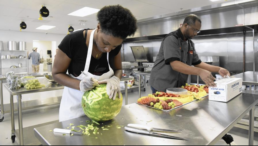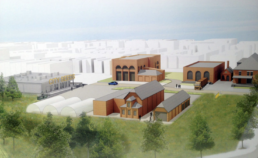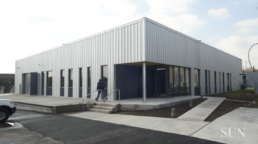Shocking developments in East Baltimore
Shocking developments in East Baltimore
Several more rowhouses on Gay Street in East Baltimore are slated for renovation. (Sun Staff)
BaltimoreSun.com by Dan Rodricks
Once upon a time in the old city, in the Baltimore we can only imagine because so much of it has vanished, members of the Eastside Association Reindeer Club gathered in a Formstone-covered rowhouse in the 1200 block of E. Preston Street. The place is empty now, a rowhouse without a row, the last structure standing on the north side of the block. Members of the social club, and most of the socializing such places once represented, are gone.
But I’m not here for nostalgia, or for dreary contemplations about how much bigger and better Baltimore used to be.
We need to get to the other side of the street because, despite all dark and dystopian views, there’s a lot going on there — the hard sweat of wrecking crews and carpenters, of brick salvagers and bricklayers. I’m not talking about tall cranes and towering buildings so much as the gritty, ground-level work of everyday redevelopment in the old rowhouse neighborhoods. There’s a shocking amount of it in East Baltimore.
Across Preston Street from the abandoned Reindeer Club, for instance, there’s a three-story apartment building in the middle of the block, rowhouses on either side, with the front entrance set back from the sidewalk. Once upon a time, the setback and arched, marble entrance must have given the building a touch of grandeur.
Building delicious communities in Baltimore
Building delicious communities in Baltimore
It used to be a derelict location for The Wire. Now it’s a hotspot for fresh local produce and a vehicle for job creation. Here’s a look at the Baltimore Food Hub.
Marriott.com by Rebecca Dalzell
For 30 years residents in East Baltimore lived beside a toxic dump. Piled with tires and rubble, the site was so derelict that it was used as a location on the HBO show “The Wire.” Yet in 2018, it’s becoming a destination: the Baltimore Food Hub, a culinary campus and community park.
Owned by the city for more than 100 years, the site was abandoned in the 1990s. In 2016, American Communities Trust, a Baltimore-based development group, bought the 3.5-acre parcel in hopes of turning it into a center for small food businesses.
The new owners cleaned up the property and removed toxic soil, making it safe to visit and bringing fresh food to an area that was previously short on healthy alternatives to fast food.
Now construction on the historic brick buildings is underway. Within two years, the Baltimore Food Hub will be home to startup food businesses that promote local and regional foods, a small farm, community grills and a green grocer. A brewery and food hall are also in the works.
Today, the community’s first tenant, a social enterprise known as City Seeds, just moved in and has already begun to set an example for what Baltimore Food Hub tenants are capable of providing to their neighbors.
American Communities Trust and Food Hub participate in annual East Baltimore Martin Luther King Jr. Day of Service
American Communities Trust and Food Hub participate in annual East Baltimore Martin Luther King Jr. Day of Service
On January 15, 2018 American Communities Trust (ACT) hosted 500 volunteers at the Baltimore Food Hub for the annual East Baltimore Martin Luther King Jr. Day of Service. Organized by The 6th Branch and Civic Works, the service day kicked off new service projects in the Broadway East community — a partnership of The 6th Branch, ACT, and the New Broadway East Community Association. Mayor Catherine Pugh, Senator Nathaniel McFadden, Delegate Cory McCray, Councilman Robert Stokes and other dignitaries spoke at the kickoff, which also included a performance by the Cardinal Sheehan School Choir. Volunteers contributed more than 2,000 hours clearing growth and removing debris at the Baltimore Food Hub and nearby vacant lots.
Read More below.
This program is looking to bring Moveable Orchards to vacant lots in Baltimore
This program is looking to bring Moveable Orchards to vacant lots in Baltimore
A crowdfunding campaign is aiming to raise $15K for a pair of initial sites in Sandtown Winchester and Oliver.
Technical.ly/Baltimore by Stephen Babcock
A new program from the Baltimore Orchard Project is looking to bring fruit trees to vacant lots and community gardens in Baltimore.
The Moveable Orchards program is aiming to plant the seed of growth on the lots, as well as provide healthy food, according to Civic Works, which runs the Baltimore Orchard Project.
The semi-permanent structures are designed to keep trees thriving in lots where land and soil quality is questionable for growing. They’ll grow figs, serviceberries, dwarf apples and pears in a container with a self-wicking bed. It’s designed to be easily lifted by a pallet truck. Once installed, the idea is that community members take leadership in cultivation.
“Because they are above-ground, self-contained structures, community members won’t need to worry about contaminants or complicated exit strategies if a lease is lost,” Baltimore Orchard Project planting coordinator Eric Sargent said in a statement.
BOP board member Alanah Nichole recently launched a crowdfunding campaign for the program, aiming to raise $15,000. The goal is to fund two moveable fruit trees. The initial sites are at the Love Farm in Sandtown Winchester and the Baltimore Food Hub in the Oliver neighborhood of East Baltimore.
Construction begins at Baltimore Food Hub
Construction begins at Baltimore Food Hub
Technical.ly Baltimore by Stephen Babcock
Just before an Amtrak train rode by the corner of East Oliver and North Wolfe in the Broadway East neighborhood on Tuesday, Mayor Stephanie Rawlings-Blake was talking about how the area is a “front door” to train commuters heading into the city.
She was standing in a former city-owned lot, surrounded by four dilapidated buildings that have stopped performing civic functions. Yet, there was talk of new life.
“This is a critical component to making that entryway vibrant and vital,” Rawlings-Blake said.
As the heavy equipment looming behind her suggested, the mayor was speaking of what’s to come on the lot. Dignitaries were gathered to break ground on the Baltimore Food Hub, a $23.5 million project that’s set to revitalize the existing 3.5-acre lot to include flexible manufacturing and office space for food businesses, food truck parking, a market and hoop houses for urban farming.
March 6, 2018
Food incubators take root in Baltimore
Food incubators take root in Baltimore
The Baltimore Sun by Sarah Meehan
When Nacole and Robert Lee were searching for a brick-and-mortar shop for their 4-year-old fruit arrangement business, unforeseen costs piled up quickly. Licensing, pest control, garbage removal — the hidden expenses put an affordable retail space out of reach.
At Frucasion Fruit Boutique’s new home in B-More Kitchen in Homeland, Nacole Lee has space to carve watermelons for intricate fruit displays without worrying about those extra costs.
Frucasion is one of the first small-scale food businesses to move into the communal work space and incubator, which opened earlier this month among a flurry of similar operations emerging to enlarge the pipeline for Baltimore’s food industry. Baltimore Food Hub, which broke ground on its five-building campus Tuesday in East Baltimore, will house a commercial kitchen, office space and manufacturing facilities for local food makers. And R. House food hall will provide space for chefs and food producers to test out new concepts when it opens this fall in Remington.
Nationwide, the number of kitchen incubators increased by more than half — to more than 200 — between 2013 and 2016, according to research by Econsult Solutions, Urbane Development and American Communities Trust, the community development nonprofit leading the renovation of the Baltimore Food Hub site. The proliferation of low-cost spaces for food startups in Baltimore will support the city’s economic health overall because the growing food industry provides a swath of jobs that don’t require college degrees, said China Boak Terrell, CEO of American Communities Trust.
“That’s what makes the food cluster so powerful for job creation, and that’s why we think it’s really important to be able to connect this campus to the food economy,” Terrell said.
Food incubators have seen success in other cities. Union Kitchen in Washington, D.C., has worked with about 200 small businesses since it opened in December 2012. Cullen Gilchrist, one of the incubator’s founders, estimates that less than 10 percent of those businesses have failed, while about 40 percent of all new businesses that opened in 2012 have failed since then, according to the U.S. Bureau of Labor Statistics.
March 6, 2018
Long-Awaited Baltimore Food Hub Breaks Ground in East Baltimore
Long-Awaited Baltimore Food Hub Breaks Ground in East Baltimore
Communal food campus to provide job training, commercial kitchens, and urban farming.
Baltimore Magazine by Lauren Cohen
The cluster of dilapidated masonry buildings that sits swallowed in untamed vines on the corner of East Oliver and North Wolfe Streets will soon become a destination for economic opportunity in East Baltimore.
Though it’s been nearly five years since plans were announced to transform the old Eastern Pumping Station site into Baltimore Food Hub, a ground-breaking ceremony held earlier today officially kick started the $23.5 million redevelopment. The project will eventually yield a 3.5-acre campus with job-training facilities, communal incubator space, and an excess of land to be dedicated to urban farming.
Members of American Communities Trust (ACT)—the national development partner overseeing the redesign alongside local workforce nonprofit Humanim—were joined by upwards of 75 local community leaders and Broadway East residents to celebrate the milestone, as trains whizzed by on the adjacent Amtrak line overhead.
Among those in attendance were City Council President Bernard C. Young, U.S. Assistant Secretary of Commerce for Economic Development Jay Williams, ACT board president Bill Struever, Maryland State Delegate Maggie McIntosh, and Mayor Stephanie Rawlings-Blake, who has made food justice a top priority throughout her administration.
“The food hub is a perfect example of what happens when purpose meets planning,” Rawlings-Blake said. “This site has been considered the front door to Baltimore that you see when you’re travelling by Amtrak. This is a critical component to making that entryway vibrant and vital, and it’s a true reflection of the future of our city.”
March 6, 2018
First building opens on East Baltimore's Food Hub campus
First building opens on East Baltimore’s Food Hub campus
The Baltimore Sun by Sarah Meehan
The first building at the Baltimore Food Hub, a planned two-acre campus of food-related businesses, opens Tuesday at a former brownfield site in East Baltimore, offering a space for novice cooks and food entrepreneurs to launch their culinary careers.
Known as the Baltimore Food Enterprise Center, the one-story silver building at 1731 Llewelyn Ave. will be home to two programs designed to grow the workforce for Baltimore’s burgeoning food industry. Over the next few months, the nonprofit Humanim will move its City Seeds and School of Food operations into the teaching kitchen, commercial kitchen and office space at the 7,500-square-foot center, which will serve as an anchor for the $25 million Food Hub campus in Broadway East as its remaining five buildings are renovated and restored.
March 6, 2018
Food Prep Worker 2
Job Description
Perform a variety of food preparation duties other than cooking, such as preparing cold foods and shellfish, slicing meat, and brewing coffee or tea.
Job Requirements
Experience:
Little or no previous work-related skill, knowledge, or experience is needed for these occupations. For example, a person can become a waiter or waitress even if he/she has never worked before. Education: Some of these occupations may require a high school diploma or GED certificate.
Training:
Employees in these occupations need anywhere from a few days to a few months of training. Usually, an experienced worker could show you how to do the job.
Top 5 Abilities
Speech Recognition — The ability to identify and understand the speech of another person.
Information Ordering — The ability to arrange things or actions in a certain order or pattern according to a specific rule or set of rules (e.g., patterns of numbers, letters, words, pictures, mathematical operations).
Oral Expression — The ability to communicate information and ideas in speaking so others will understand.
Problem Sensitivity — The ability to tell when something is wrong or is likely to go wrong. It does not involve solving the problem, only recognizing there is a problem.
Deductive Reasoning — The ability to apply general rules to specific problems to produce answers that make sense.
Top 5 Skills
Active Listening — Giving full attention to what other people are saying, taking time to understand the points being made, asking questions as appropriate, and not interrupting at inappropriate times.
Monitoring — Monitoring/Assessing performance of yourself, other individuals, or organizations to make improvements or take corrective action. Speaking — Talking to others to convey information effectively.
Coordination — Adjusting actions in relation to others’ actions.
Time Management — Managing one’s own time and the time of others.
Food Prep Worker
Job Description
Perform a variety of food preparation duties other than cooking, such as preparing cold foods and shellfish, slicing meat, and brewing coffee or tea.
Job Requirements
Experience:
Little or no previous work-related skill, knowledge, or experience is needed for these occupations. For example, a person can become a waiter or waitress even if he/she has never worked before. Education: Some of these occupations may require a high school diploma or GED certificate.
Training:
Employees in these occupations need anywhere from a few days to a few months of training. Usually, an experienced worker could show you how to do the job.
Top 5 Abilities
Speech Recognition — The ability to identify and understand the speech of another person.
Information Ordering — The ability to arrange things or actions in a certain order or pattern according to a specific rule or set of rules (e.g., patterns of numbers, letters, words, pictures, mathematical operations).
Oral Expression — The ability to communicate information and ideas in speaking so others will understand.
Problem Sensitivity — The ability to tell when something is wrong or is likely to go wrong. It does not involve solving the problem, only recognizing there is a problem.
Deductive Reasoning — The ability to apply general rules to specific problems to produce answers that make sense.
Top 5 Skills
Active Listening — Giving full attention to what other people are saying, taking time to understand the points being made, asking questions as appropriate, and not interrupting at inappropriate times.
Monitoring — Monitoring/Assessing performance of yourself, other individuals, or organizations to make improvements or take corrective action. Speaking — Talking to others to convey information effectively.
Coordination — Adjusting actions in relation to others’ actions.
Time Management — Managing one’s own time and the time of others.
